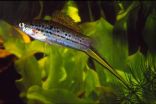(Press-News.org) ITHACA, N.Y. – Although feelings are personal and subjective, the human brain turns them into a standard code that objectively represents emotions across different senses, situations and even people, reports a new study by Cornell University neuroscientist Adam Anderson.
"We discovered that fine-grained patterns of neural activity within the orbitofrontal cortex, an area of the brain associated with emotional processing, act as a neural code which captures an individual's subjective feeling," says Anderson, associate professor of human development in Cornell's College of Human Ecology and senior author of the study. "Population coding of affect across stimuli, modalities and individuals," published online in Nature Neuroscience.
Their findings provide insight into how the brain represents our innermost feelings – what Anderson calls the last frontier of neuroscience – and upend the long-held view that emotion is represented in the brain simply by activation in specialized regions for positive or negative feelings, he says.
"If you and I derive similar pleasure from sipping a fine wine or watching the sun set, our results suggest it is because we share similar fine-grained patterns of activity in the orbitofrontal cortex," Anderson says.
"It appears that the human brain generates a special code for the entire valence spectrum of pleasant-to-unpleasant, good-to-bad feelings, which can be read like a 'neural valence meter' in which the leaning of a population of neurons in one direction equals positive feeling and the leaning in the other direction equals negative feeling," Anderson explains.
For the study, the researchers presented participants with a series of pictures and tastes during functional neuroimaging, then analyzed participants' ratings of their subjective experiences along with their brain activation patterns.
Anderson's team found that valence was represented as sensory-specific patterns or codes in areas of the brain associated with vision and taste, as well as sensory-independent codes in the orbitofrontal cortices (OFC), suggesting, the authors say, that representation of our internal subjective experience is not confined to specialized emotional centers, but may be central to perception of sensory experience.
They also discovered that similar subjective feelings – whether evoked from the eye or tongue – resulted in a similar pattern of activity in the OFC, suggesting the brain contains an emotion code common across distinct experiences of pleasure (or displeasure), they say. Furthermore, these OFC activity patterns of positive and negative experiences were partly shared across people.
"Despite how personal our feelings feel, the evidence suggests our brains use a standard code to speak the same emotional language," Anderson concludes.
INFORMATION:
Cornell University has television, ISDN and dedicated Skype/Google+ Hangout studios available for media interviews.
Study cracks how the brain processes emotions
2014-07-09
ELSE PRESS RELEASES FROM THIS DATE:
Bacteria hijack plentiful iron supply source to flourish
2014-07-09
In an era of increasing concern about the prevalence of antibiotic-resistant illness, Case Western Reserve researchers have identified a promising new pathway to disabling disease: blocking bacteria's access to iron in the body.
The scientists showed how bacterial siderophore, a small molecule, captures iron from two abundant supply sources to fan bacterial growth — as well as how the body launches a chemical counterassault against this infection process. Their findings appear in a recent edition of The Journal of Experimental Medicine.
"Bacterial siderophore will be ...
Climate change provides good growing conditions for charcoal rot in soybeans
2014-07-09
URBANA, Ill. – With over 100 diseases that can attack soybean crops, why would charcoal rot rise to the top of the most wanted list? University of Illinois scientists cite the earth's changing climate as one reason that more research is needed on the fungus that causes charcoal rot.
Fungi may often be associated with cool, damp growing conditions but Macrophomina phaseolina, the fungus that causes charcoal rot, prefers hot and dry drought conditions.
"As the climate continues to change and we see more extremes in the weather, including hotter, drier summers, this fungus ...
Biologists link sexual selection and placenta formation
2014-07-09
RIVERSIDE, Calif. — Sexual selection refers to species' selection for traits that are attractive to the opposite sex. This special type of natural selection enhances opportunities to mate, the tail of male peacocks being an iconic example.
Biologists at the University of California, Riverside have now found that sexual selection and "placentation" — the formation of a placenta — are linked. Describing the life histories of more than 150 species of fish in the family Poeciliidae, the researchers found that species with placentas tend to have males that do not have bright ...
USF study: Amphibians can acquire resistance to deadly fungus
2014-07-09
Tampa, Fla. (July 9, 2014) – Emerging fungal pathogens pose a greater threat to biodiversity than any other parasitic group, causing population declines of amphibians, bats, corals, bees and snakes. New research from the University of South Florida published in the prestigious journal Nature reveals that amphibians can acquire behavioral or immunological resistance to a deadly chytrid fungus implicated in global amphibian population declines.
"Acquired resistance is important because it is the basis of vaccination campaigns based on 'herd immunity', where immunization ...
Fox Chase researchers recommend updating the staging criteria for breast cancer diagnoses
2014-07-09
New findings from Fox Chase Cancer Center paint a relatively optimistic picture of women's chances of surviving a subset of breast cancers that have spread to the chest wall or skin, but not beyond.
Tumors that grow into the skin, regardless of size and whether they have involved lymph nodes, are automatically classified as stage III – and called "locally advanced" tumors, suggesting that they are a relatively serious form of cancer, often with poor survival. Locally advanced breast cancers of this and other types account for five to ten percent of new breast cancer ...
MyChart use skyrocketing among cancer patients, UT Southwestern study finds
2014-07-09
DALLAS – July 9, 2014 – There has been a sharp increase in the number of cancer patients at UT Southwestern Medical Center using MyChart, the online, interactive service that allows patients to view laboratory and radiology results, communicate with their healthcare providers, schedule appointments, and renew prescriptions.
Over a six-year period, the number of patients actively using MyChart each year increased five-fold, while the number of total logins each year increased more than 10-fold, according to a study by Dr. David Gerber, Associate Professor of Internal Medicine, ...
New study finds that Adélie penguin population is on the rise
2014-07-09
A first-ever global census of Adélie penguins shows that the population is 3.79 million breeding pairs or 53 percent larger than previously estimated. Adélie penguins have long been considered a key indicator species to monitor and understand the effects of climate change and fishing in the Southern Ocean.
By using high-resolution satellite imagery, researchers from Stony Brook University and University of Minnesota have applied a new method that permits regular monitoring of Adélie penguins across their entire breeding range, and by extension the health of the Southern ...
Researchers declassify dinosaurs as being the great-great-grandparents of birds
2014-07-09
The re-examination of a sparrow-sized fossil from China challenges the commonly held belief that birds evolved from ground-dwelling theropod dinosaurs that gained the ability to fly. The birdlike fossil is actually not a dinosaur, as previously thought, but much rather the remains of a tiny tree-climbing animal that could glide, say American researchers Stephen Czerkas of the Dinosaur Museum in Blanding, Utah, and Alan Feduccia of the University of North Carolina. The study appears in Springer's Journal of Ornithology.
The fossil of the Scansoriopteryx (which means "climbing ...
Figuring out methane's role in the climate puzzle
2014-07-09
The U.S. may be on the verge of an economy driven by methane, the primary component of natural gas, which burns cleaner than coal and is undergoing a production boom. It has poised the country as a top fuel producer globally, but recent research is casting serious doubts over just how climate-friendly it is, according to an article in Chemical & Engineering News (C&EN), the weekly news magazine of the American Chemical Society.
In the article, Jeff Johnson, a senior correspondent at C&EN, explains that when burned as a fuel to produce electricity, methane emits about ...
Investigators from Montefiore and Einstein to present data at 2014 Alzheimer's Association International Conference
2014-07-09
NEW YORK (July 8, 2014) – Researchers from Montefiore Medical Center and the Albert Einstein College of Medicine of Yeshiva University will present new findings at the Alzheimer's Association International Conference (AAIC) being held July 12 – July 17 in Copenhagen, Denmark. Data from the four abstracts will focus on triggers that could prompt transition from cognitive normality to mild cognitive impairment and dementia. The research is part of the Einstein Aging Study, established in 1980 to examine healthy brain aging as well as the special challenges of Alzheimer's ...






